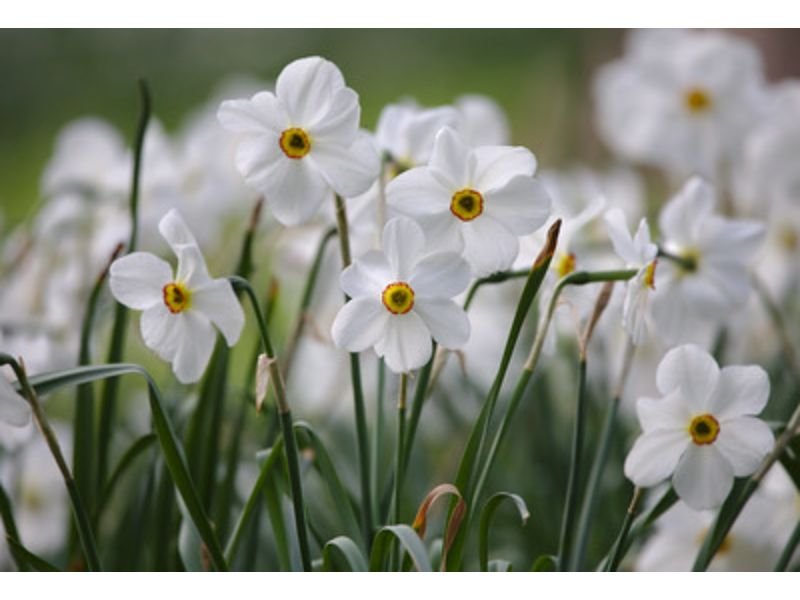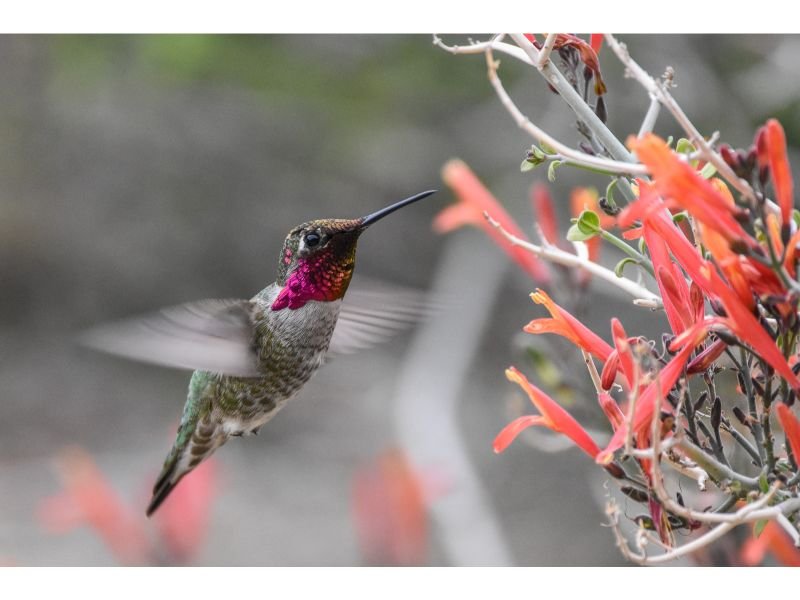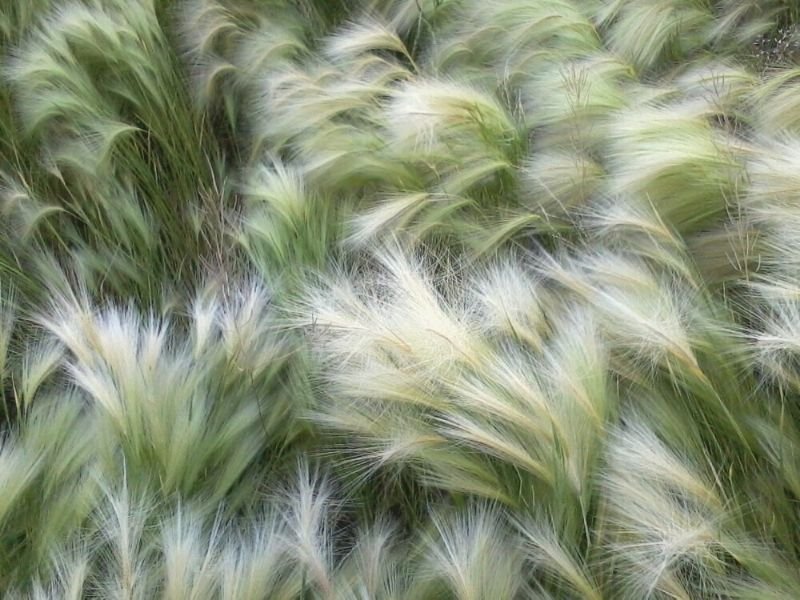Are you looking for some flowers to grow in your full-sun garden? Why don’t you try this idea: plant it with sun-loving red flowers! As one of the most attention-grabbing colors that is often associated with love and passion, plants with red blossoms could spark the visual of your garden–what’s more, they’re such impressive pollinator-magnet too. Whether it’s annual or perennial, there are plenty of the best red flowers for sun to incorporate into your landscape.
Table of Contents
How Did The Red Flowers For Sun Get Their Striking Red Color?
In the wild, flowers, as do with their foliage, thrive in numerous hues. Aside from color, plants also differ in the way they react to sunlight exposure. Some may be a combination of the classic yellow and green tone and thrive well only under shady areas. Whilst some are in the color of blood and fire–that is red, and are excellent sun-lovers.
The chemicals called anthocyanins and carotenoids are responsible for the red colors among plants. Other factors such as the amount of light, temperature, and the soil’s pH level plays a huge impact on the different coloration between the flowering plants. Another important factor like stress that the plant experiences from the outside environment, for instance, drought, also plays a role.
Beyond planting your garden with these annual or perennial red flowers for sun, don’t forget to include any other colors such as yellow, orange, and white, to create more contrast and diversity.
Perennial Red Sun Plant
Red Hollyhock (Alcea rosea)
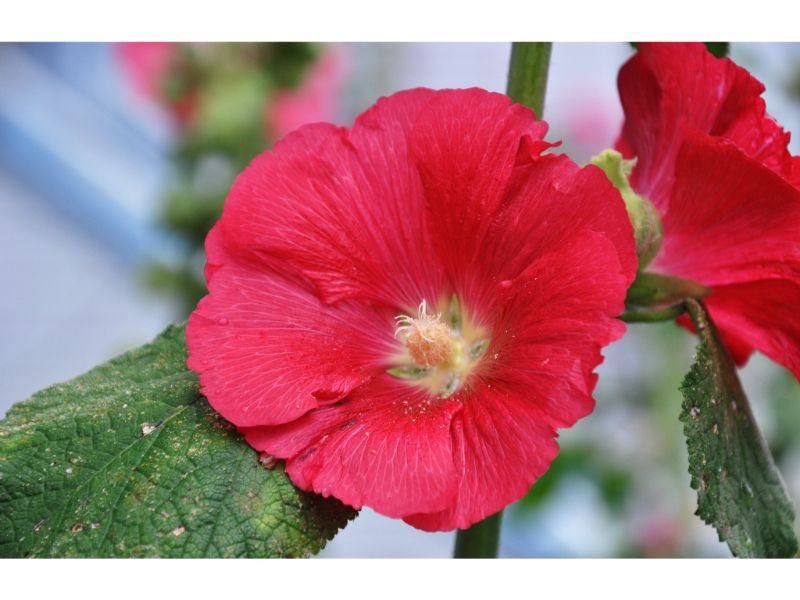
Growing Zones: 2 to 10
Soil: Good drainage, occasionally dry but keep the soil moist
Resistant To Challenges: Mostly rust, rabbits
These red flowers for sun are rich in emollient, demulcent, and diuretic properties, which make them often used as a tea to improve blood circulation, constipation, and hemorrhage. Enjoy their blooming time around fall, summer, and winter.
Flamingo Lily (Anthurium)
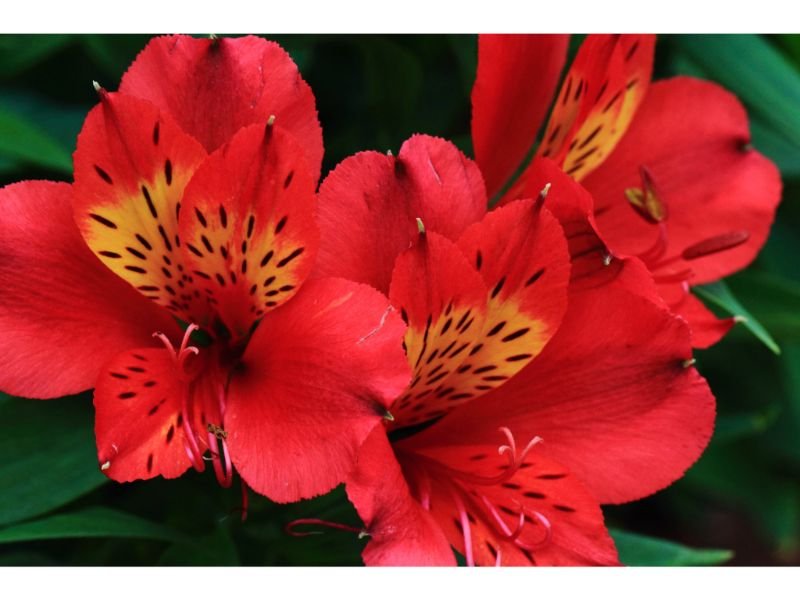
Growing Zones: 10 to 12
Soil: Loam, well-drained, slightly acidic
Resistant To Challenges: Deer, rabbits
With a glossy deep magenta to red, and blooms that are shaped like a painter’s palette, the flamingo lily is one of the most famous tropical plants with showy blossoms. To prevent Rhizoctonia, a fungi-infected disease that often affects flamingo lilies, you can use the help of commercially available fungicides.
Red Rose Snapdragon (Antirrhinum multiflorum)
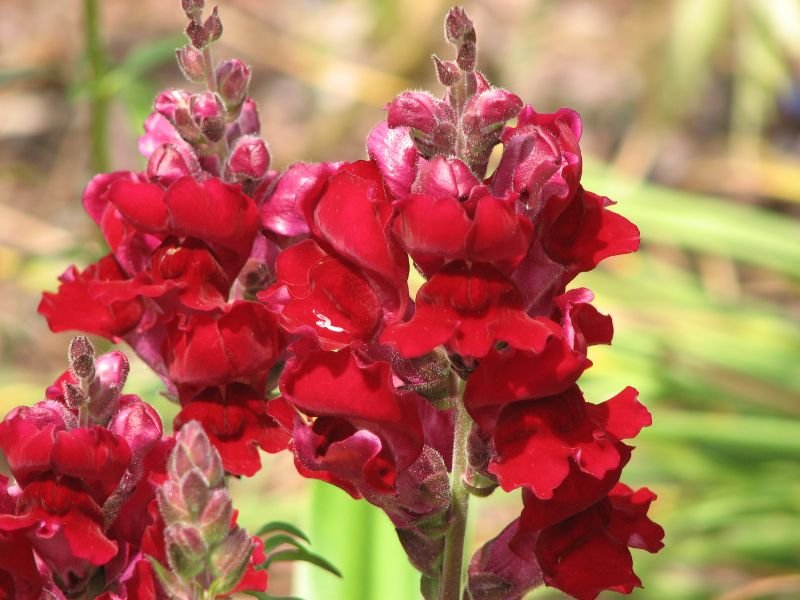
Growing Zones: 8 to 10
Soil: Sandy, clay, loam
Resistant To Challenges: Deer
Featuring upright flowers that bloom in spring and summer, the red rose snapdragon can be grown as perennial and annual. The reason why it’s one of the best red flowers for sun is the inflorescence shape that adorns it with deep blood-red color.
Celosia (Celosia)

Growing Zones: 10 to 11
Soil: Sand, loam, high organic matter
Resistant To Challenges: Deer, quite a drought tolerant
The delicate celosia flowers are known for their bloom shape, which resembles a rooster’s comb. These red perennial flowers full sun lovers can grow perfectly in small areas like containers, as well as near pond and pool areas. When they haven’t matured yet, the foliage part of celosia can be eaten and taste like spinach.
African Corn Lilies (Ixia)

Growing Zones: 8 to 10
Soil: High organic matter
Resistant To Challenges: Deer, drought tolerant once established
Don’t be fooled by their name, the African con lilies are not part of the Lily Family. In fact, they’re in the same blood lineage as the Iris Family. With their small, cup or star-shaped showy blossoms, these red flowers for sun would produce such spectacular cut flowers!
Scarlet Bee Balm (Monarda didyma)

Growing Zones: 4 to 9
Soil: High organic matter, soil
Resistant To Challenges: Deer, rabbits, black walnut
Being a primadonna and one of the best red flowers for sun, the scarlet bee balm will seduce you with its showy and fragrant deep red blooms. These fall and summer bloomers are also a tasty snack for most pollinators like butterflies and hummingbirds.
Starflower (Xerochrysum bracteatum)
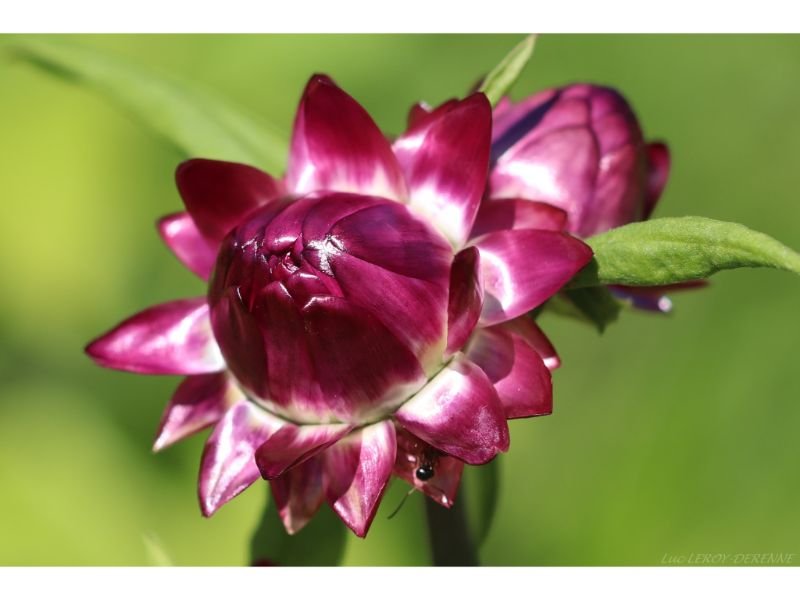
Growing Zones: 8 to 10
Soil: Sandy, loam, clay
Resistant To Challenges: Deer
Also known as the everlasting daisy, starflowers have showy, small, daisy-like flowers with deep red, reddish-orange, or burgundy petals and a bright yellow center. To propagate this red sun plant, you can do so by stem cutting or by using its seed.
Annual Red Sun Plant
Prince’s Feather (Amaranthus hypochondriacus)
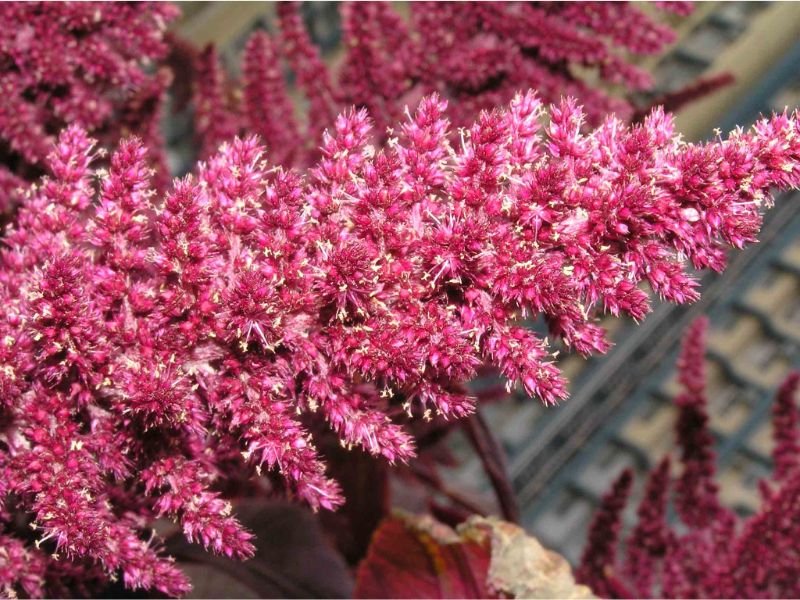
Growing Zones: 3 to 10
Soil: Sandy, loam, clay, well-drained
Resistant To Challenges: Deer
A Mexico and Central America native, the prince’s feathers are part of the Amaranthaceae or the Amaranth Family. Producing showy deep red or magenta inflorescences and is also fairly not complicated to maintain, it’s easy to see why this fall bloomers became one of the best red flowers for sun.
Red Calibrachoa (Calibrachoa x hybrida)

Growing Zones: 7 to 11
Soil: Loam, high organic matter
Resistant To Challenges: Heat, drought
This hybrid calibrachoa species will never fail you with its petunia-like blossoms that attract mostly hummingbirds. These red flowers for sun grow only from 10 to 30 centimeters tall and are also ideal for containers, hanging baskets, or window gardens.
Red New Guinea Impatiens (Impatiens hawkeri)

Growing Zones: 10 to 12
Soil: Good drainage, keep moist, acidic
Resistant To Challenges: Mildew
The red guinea impatiens are valuable for gardeners because of their showy blossoms. To add, these are one of the best red flowers for sun and are also good as decorative flowering plants. They don’t require much maintenance, just make sure you don’t over-watering them as they are not drought tolerant.
Firecracker Plant (Russelia equisetiformis)
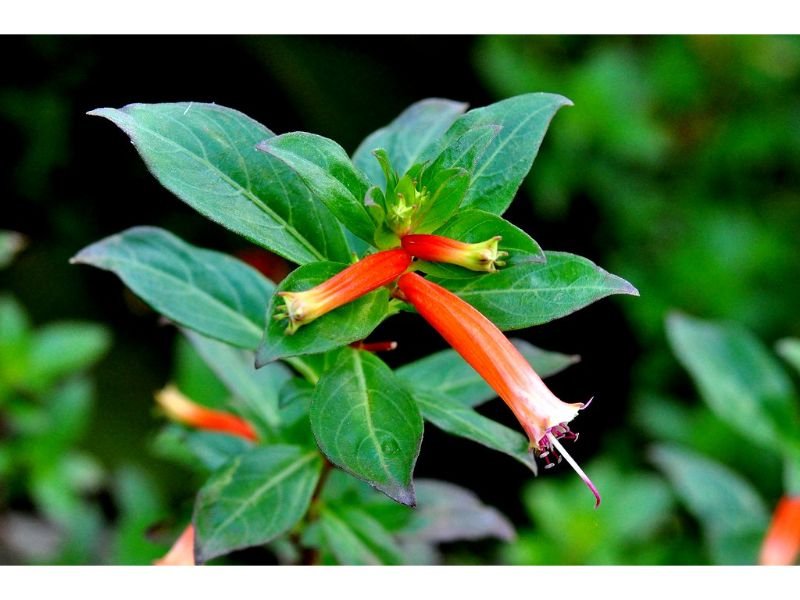
Growing Zones: 9 to 11
Soil: Well-drained, occasionally wet
Resistant To Challenges: Heat, salt
These exotic beauties are tropical shrubs that are commonly grown for their attractive long, tubular-shaped bright red blooms. Once matured and established, the native to Mexico charms can be grown in a moist area like near a pond.
Red Candytuft (Iberis amara)
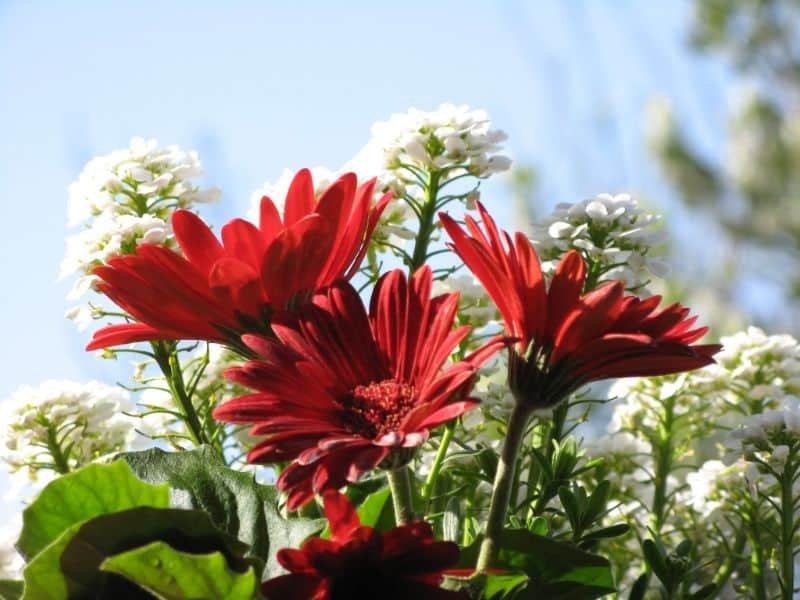
Growing Zones: 6 to 9
Soil: Sandy, loam, clay
Resistant To Challenges: Deer, rabbits, poor soil
Why do these best red flowers for sun called candytuft? Aside from their attractive, showy, and fragrant blossoms, the name ‘candytuft’ was derived from Crete or Candia Island, the place where the plant was first discovered. They bloom in summer and mostly attract bees.
Red Purslane (Portulaca)
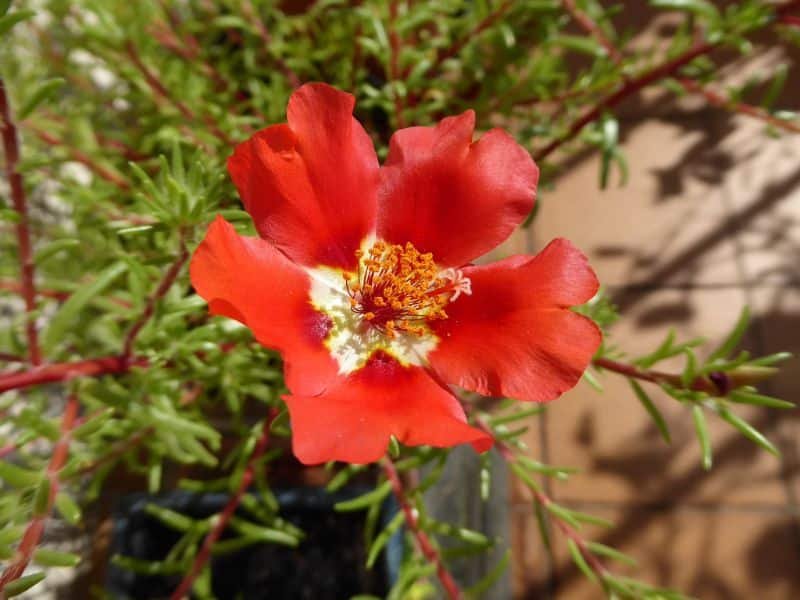
Growing Zones: All hardiness zones
Soil: Well-drained, sandy, rocky, slightly acidic
Resistant To Challenges: Drought, heat
With red purslane, you don’t have to worry about your hardiness zone as this eye-catching flowering plant thrives well in almost any continent, except the Arctic. They produce rose-like tiny flowers with fleshy, spiky, dark green or bright green foliage. This red sun plant will look great in any rocky-themed garden.
Scarlet Sage (Salvia splendens)

Growing Zones: 10 to 11
Soil: Well-drained, moist, loam, sand
Resistant To Challenges: Deer
Last but definitely not least, the best red flowers for sun are the mighty scarlet sage. These fall, spring, and summer bloomers are widely known for their ‘true’, deep red color which is the ultimate attention-grabbing for pollinators. The scarlet sage varies in color and size depending on which cultivar.
Wind Up: What Are The Best Red Flowers For Sun?
There you have it, the best of the best red flowers for sun to glow up and fill your full sun landscape area. Apart from attracting pollinators with their dramatic shades of red blossoms, most of these flowers are also easy to maintain and resistant to a few challenges such as drought, deer, and heat–making it easier and less headache for you to take care of.

New author in the hood. Loves gardening and flowers are my spirit animals (yes I know they are not animals but I insist). I will be covering most of the flowers’ topics here and occasionally random though as well.

